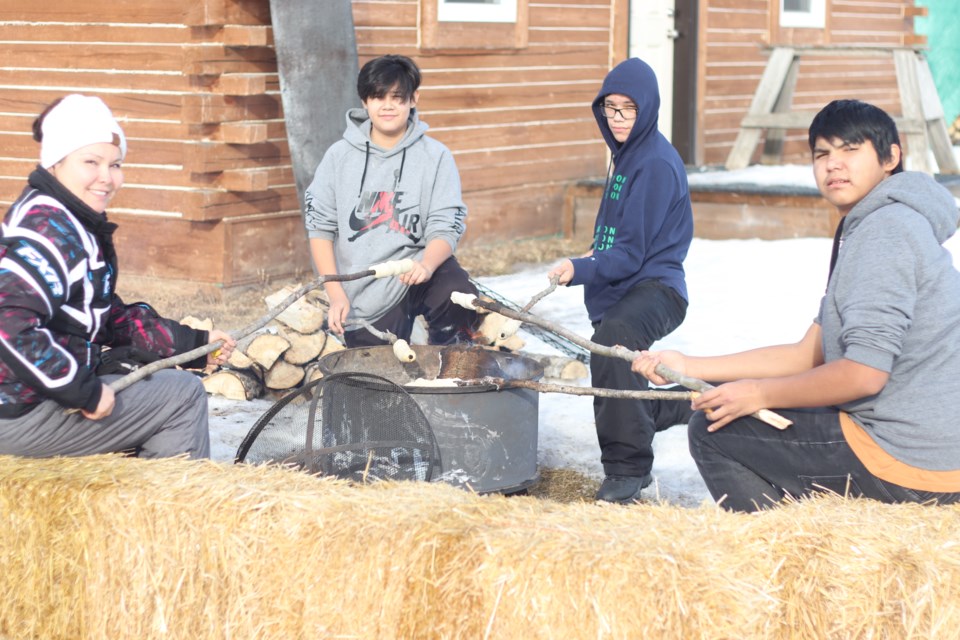WHITEFISH LAKE – A group of young students, bundled up in warm winter clothing, approached a sled attached to a trio of dogs. The cold air nipped at their noses and cheeks, but the thrill of gliding across a snow-covered landscape was evident as they cheered in excitement.
Three of the students jumped on the sled, as a guide stood behind them, signaling for the dogs to take off – barking and howling as they pulled the sled across the snowy terrain.
The students' laughter echoed as they glided across the open expanse, their sled leaving a trail of snow in their wake.
It was the final day of Tribal Chiefs Education Foundation’s three-day land-based education winter camp on Feb. 9, held at Pakan Elementary and Junior High School in Whitefish Lake First Nation #128. Students from several First Nations schools visited Goodfish Lake to learn about Indigenous traditions.
The three-day land-based education winter camp was coordinated by Maggie Buffalo, Marlene Quinney, and Russell Hunter.
In a moment away from the youth, one of the foundation’s land-based coordinators, Russell Hunter, took rest from his activities. He sat on a bale of hay, eyes fixed upon the crackling fire before him.
“We’re bringing students from other Nations and we’re going through various [Indigenous] teachings,” he explained. “One of them is dog sledding.”
He said, “our friends – the dogs,” hold a special relationship with the First Nations people, a relationship steeped in culture, beliefs, and tradition.
The students were also exposed to Indigenous history and tales through storytelling with the elders.
“Wintertime is traditionally a time for stories,” according to Hunter.
Other activities included students learning about fishing, cooking bannock, and snow shoeing.
Hunter said that at the start of the winter camp, local hunters also brought in a moose, and students had the opportunity to watch the moose be cut up and stored.
Traditional games were also played, such as “Run and Scream” where students take a big breath and run as fast as they can while screaming at the top of their lungs before they run out of air. The students marked a spot where they would draw their next breath, and then they tried to surpass their own mark or the mark of others.
Donna Favel, who teaches at Kinokamâsihk Kiskinohamâtokamik (Kehewin) and is also a member of the Whitefish Lake community, watched as students played Run and Scream.
“It’s a wonderful experience for students to be involved with the land-based teachings, because it gives them the opportunity to have fun while also learning traditional games and teachings,” she said. Favel said land-based learning is important, reiterating that it allows students to learn from their elders, gain knowledge, while keeping “our culture and language” alive.
“I think we need to keep doing this more often,” she said. “It will help our students connect with the land, and it will also continue to teach our children about their identity and culture.”
Hunter shared the same sentiment, saying land-based learning is important because it connects students with their roots, “with themselves, with creation, and with the land."
“We need to go back to our traditions, our language, and our songs because we carry something beautiful in all of us, and not just our people – everybody carries that. Everyone has a culture and language. We just need to facilitate experiences that will awaken that,” said Hunter.
He added that land-based learning also helps reframe and reimagine education for Indigenous youth, by integrating Indigenous culture and the way education was done in the past.
Hunter concluded by thanking everyone who was part of the camp, from the students to the staff, to the elders, and the whole school. Without the help and support from everybody, he said the land-based learning winter camp would not have been possible.
He also thanked local residents, explaining that they too are knowledge keepers with much knowledge to share with young people.
“It takes a whole team to do this – not just one man.”



